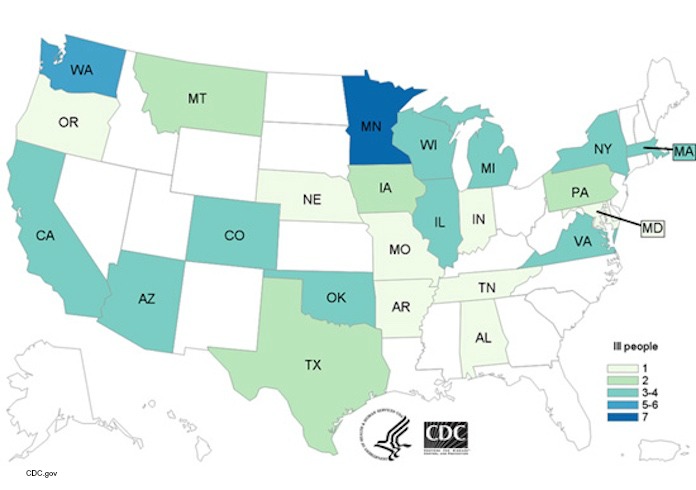The E. coli O121 and O26 outbreak linked to recalled Gold Medal flour from General Mills is over, according to the CDC, but the government expects illnesses to continue for some time. These products have long shelf lives and may still be in consumers’ homes.

A list of the recalled products and how to identify them is at the CDC web site. The recalled products include several varieties of Gold Medal flour, along with brownie and cake mixes, bread mixes, muffin mixes, pancake and biscuit mixes, and meat and poultry products that were made with the recalled flours.
A total of 63 people in 24 states have been infected so far. Seventeen of those people were hospitalized for their illnesses. One person developed hemolytic uremic syndrome (HUS). No deaths were reported in this outbreak. This is an increase of 17 more ill persons since the last update on July 26, 2016.
Epidemiologic, laboratory, and traceback evidence indicates that flour made at the General Mills facility in Kansas City, Missouri was the likely source of this outbreak. The case count by state is: Alabama (1), Arkansas (1), Arizona (3), California (3), Colorado (4), Iowa (2), Illinois (4), Indiana (1), Massachusetts (3), Maryland (1), Michigan (4), Minnesota (7), Missouri (1), Montana (2), Nebraska (1), New York (4), Oklahoma (3), Oregon (1), Pennsylvania (2), Tennessee (1), Texas (2), Virginia (3), Washington (5), and Wisconsin (4).
Public health officials used PulseNet to find people who were part of this outbreak. This is the national subtyping network of public health and food regulatory agency laboratories. Scientists use DNA fingerprinting, known as pulsed-field gel electrophoresis (PFGE) and whole genome sequencing (WGS) to identify bacteria isolated from ill persons and from products and facilities.
Illnesses in this outbreak ranged from December 21, 2015 to September 5, 2016. The patient age range is from 1 year to 95, with a median age of 18. This low age range is attributed to teenagers eating uncooked cookie dough made with the flour.
In interviews, 76% of 37 ill persons said that they or someone in their household used flour the week before they got sick. Fifty percent of 38 people interviewed reported eating or tasting homemade dough or batter. Fifty seven percent of 37 people interviewed used Gold Medal brand flour. And three of the patients, all children, ate or played with raw dough at restaurants before they got sick.
In June 2016, FDA testing isolated Shiga toxin-producing E. coli (STEC) O121 bacteria in open samples of General Mills flour collected from the homes of patients in Arizona, Colorado, and Oklahoma. And in July 2016, testing by General Mills and the FDA isolated STEC O26 from a sample of General Mills flour. These samples were “closely related genetically” to the STEC O121 and STEC O26 isolates from ill persons. General Mills issued several recalls of flour and expanded the recalls to include more production dates after these tests were completed.
Officials say that “this outbreak is a reminder that it is not safe to taste or eat raw dough or batter, whether made from recalled flour or any other flour. Flour or other ingredients used to make raw dough or batter can be contaminated with STEC and other germs that can make people sick.”
The symptoms of an E. coli infection include severe abdominal cramps, mild fever, and diarrhea that may be bloody and/or watery. Symptoms usually appear two to eight days after exposure to the bacteria. Most people recover on their own, but some become so ill they must be hospitalized.
A life-threatening complication to this infection called hemolytic uremic syndrome (HUS) can develop in some people, especially the very young. The symptoms of HUS include little or no urine output, lethargy, skin rash, easy bruising, and bleeding from the nose or mouth. Anyone experiencing these symptoms should be taken to a doctor immediately.




